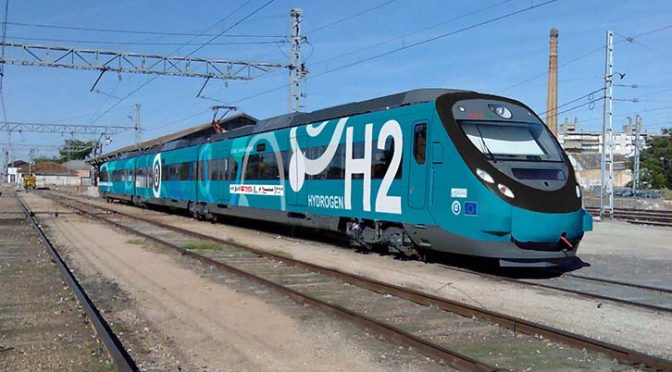- They sign an agreement whose main objective is the global promotion of emission-free green hydrogen rail transport.
- Millán García-Tola: “This alliance reinforces Iberdrola’s commitment to decarbonisation”.
Iberdrola and the CAF (Construcciones y Auxiliar de Ferrocarriles) group have formed an alliance to promote the use of green hydrogen in the railway sector and in passenger transport. The agreement was formed by Iosu Ibarbia, CAF’s Director of Technology, and Millán García-Tola, the electricity company’s Director of Green Hydrogen.
This alliance stems from the conviction of both companies to offer comprehensive sustainable mobility solutions, ranging from the supply of rolling stock and refuelling infrastructure to green hydrogen production plants and renewable energy infrastructures.
For Millán-García Tola, Iberdrola’s Global Director of Green Hydrogen, “this alliance reinforces Iberdrola’s commitment to the decarbonisation of transport that is difficult to electrify. Together with CAF, a leader in sustainable mobility, we want to continue to make solutions that accelerate the transition to emission-free transport a reality. Both companies complement each other perfectly, and together we can offer comprehensive complementary responses to the electrification of transport, a sector responsible for a third of the EU’s greenhouse gas emissions”.
“CAF has been firmly committed for many years to the development of its own power electronics, energy storage and battery technologies, and more recently hydrogen. We believe that this collaboration agreement with Iberdrola reinforces this commitment and will make a significant contribution to meeting the decarbonisation objectives in the mobility sector”, says Iosu Ibarbia, CAF Group Technology Director, on the agreement reached by both companies.
The train will be greener than ever
Currently, there are railway lines with sections that are difficult to electrify, where trains powered by fossil fuels are used. The aim of this alliance is to promote comprehensive solutions to replace these trains without the need to install catenary or make major modifications.
The objective is also to develop the renewable hydrogen value chain with the highest standards of safety, technology and competitiveness in environments such as the railway sector and passenger transport, helping to drive local companies to develop the technology and production capacity to drive the transformation of the sector in Spain and compete in the international market.
In April this year, tests are scheduled to begin on the new train developed by CAF at its Zaragoza plant as part of the FCH2RAIL project, which will be powered by green hydrogen supplied by Iberdrola from the latter’s plant in Barcelona.
This project, led by CAF, is already at an advanced stage in the design and manufacture of a hydrogen train prototype which, based on a RENFE Civia series commuter train, will install a new electricity generation system in this unit based on the hybridisation of energy from hydrogen cells and batteries, integrating in turn with the vehicle’s existing traction system, and thus constituting one of the first railway demonstrators of a two-mode vehicle with a hydrogen cell.
The hydrogen plant that will move transport in Barcelona
Iberdrola, a leader in the development of green hydrogen, already has two operational production plants in Spain. The supply of green hydrogen for this demonstration project will come from Iberdrola’s new plant in Barcelona, which came into operation at the beginning of 2022.
This IBERDROLA-owned hydrogen plant is located in Barcelona’s Zona Franca, close to the city’s airport, and will supply green hydrogen to TMB buses from January 2022, making it the first commercial and renewable hydrogen plant in Spain. This plant is part of Iberdrola’s Green Hydrogen strategy, which includes other projects such as the alliance with Fertiberia in Puertollano, as well as the recently announced Green Hydrogen Cluster Puerta de Europa in Andalusia, which includes more than 80 companies”.


